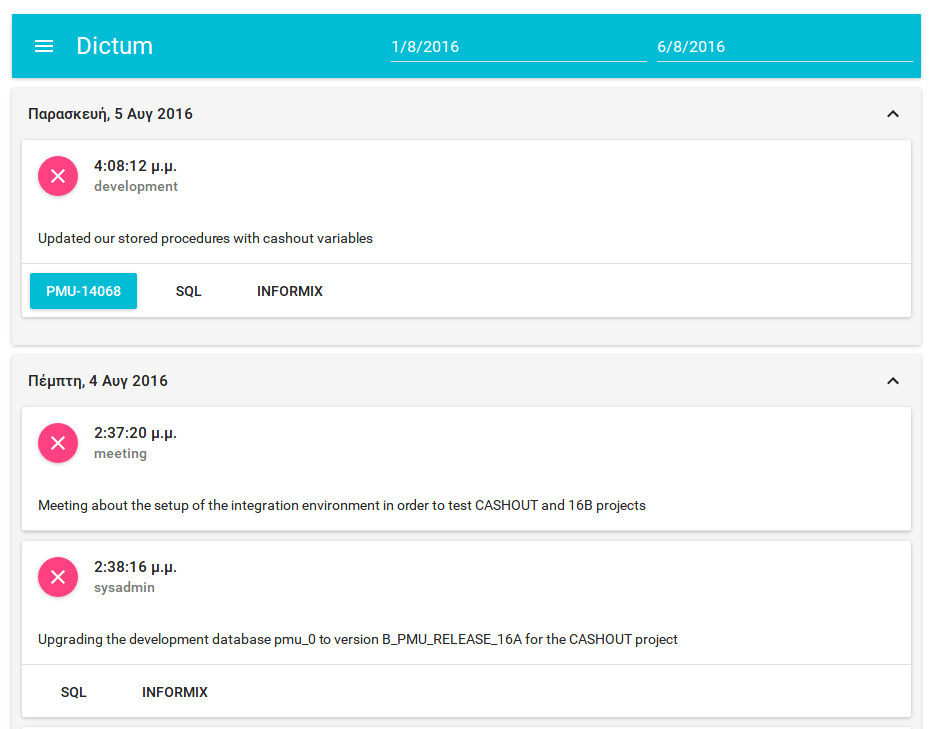dictum v0.0.0
dictum

I created this project in order to visualize the data that I keep for my day-to-day activities at work and make myself familiar with React. For the ui I used material-ui.
Having a record of the tasks that I do daily saves me a lot of time from a variety of managerial responsibilities:
- Completing the self-assessment part of the yearly appraisal process.
- Filling in expense forms at the end of each month.
It's also a place for me to keep technical notes, which took me a lot of time to figure out, but are not something that you do daily to memorize. Having notes helps dig up a certain oneliner command easily, without the need to use google for one hour.
I keep my notes in a couchdb instance that I run locally, because it has very good replication and also runs perfectly with pouchdb. In order to capture a task doc, I have become accustomed to using the command line, so I use a small nodejs wrapper included in this repository, here.
A dictum doc expects to have some specific attributes. Here is the json representation of the first activity rendered in the screenshot:
{
"_id": "2016-08-05T13:08:12.155Z",
"_rev": "1-c0b645435108ee385fd150a008b23f1f",
"type": "development",
"lang": [
"sql",
"informix"
],
"ticket": "PMU-14068",
"desc": "Updated our stored procedures with cashout variables"
}and this is the client.js call that created the above:
./client.js --type development --lang "sql,informix" --ticket PMU-14068 --desc "Updated our stored procedures with cashout variables"- _id: This is automatically generated based on the timestamp at the time that the task was captured. Basically it's a
new Date().toJSON(); I usually have 3-4 entries per day, which makes the timestamp good enough for a primary key. - _rev: Automatically generated by pouchdb/couchdb.
- type: The type of the task that you did. I'm working as a developer, so I'm usually using "development", "analysis", "meeting" and "sysadmin".
- lang: An array that is automatically created from a comma separated string list by the client. It's supposed to hold the main technologies that were required by the task.
- ticket: Jira ticket identifier. Creates an href and appends the ticket number, so the corresponding jira ticket is easily accessible. The URL can easily be modified to fit your personal needs.
- desc: A small description of what you did.
Installation
- git clone
- Install couchdb and create a database named "work". If you use a port other than 5984, or you are not running couchdb at localhost, you'll have to change couchdb endpoints in this and this file.
- npm install
- npm run build
- Use build/index.html to visualize the tasks that you have added with the client.js program. I usually create a symlink from my apache's /var/www/html to point to /path/to/dictum/build and access it using localhost/dictum .
Roadmap
- Create pie charts that visualize type and lang statistics.
- Pressing the clear button of a doc should really delete the doc from the database.
- Remove a doc from the list if a changes feed with the deleted attribute is received.
- Remove hardcoding of my personal needs and make the project more configurable (e.g. locale, jira href, couchdb location)
10 years ago